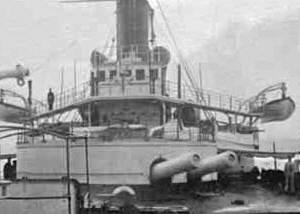BL 12 inch naval gun Mk I - VII
| Ordnance BL 12 inch gun Mk I - VII | |
|---|---|

|
|
| Type |
Naval gun Coastal gun |
| Place of origin | United Kingdom |
| Service history | |
| In service | 1882–1920 |
| Used by | Royal Navy |
| Production history | |
| Variants | Mks I - VII |
| Specifications | |
| Weight | Mk I : 47 tons barrel & breech Mk II - V 45 tons Mk VI, VII : 46 tons |
| Barrel length | Mk I & II : 301.7 inches (7.663 m) bore (25.14 calibres) Mk III - VII 303 inches (7.696 m) bore (25.25 calibres) |
|
|
|
| Shell | 714 pounds (324 kg) |
| Calibre | 12-inch (304.8 mm) |
| Muzzle velocity | 1,910 feet per second (582 m/s) |
| Effective firing range | 8,000 yards (7,300 m) at 9° 57' |
The BL 12 inch naval gun Mk I was a British rifled breech-loading naval gun of the early 1880s intended for the largest warships such as battleships and also coastal defence. It was Britain's first attempt to match the large guns being installed in rival European navies, particularly France, after Britain transitioned from rifled muzzle-loading guns to the modern rifled breech-loaders somewhat later than the European powers. Mks I - VII all had a barrel of approximately 303 inches in length (25.25 calibres) and similar performance.
Mk II was installed on battleships Colossus (1882) from 1882, Collingwood (1882) and the coastal service ironclad Conqueror (1881). Mk II guns failed in service and were quickly replaced by Mks III. IV and V, with many changes and improvements. The later marks were also mounted on Hero (1885), sistership of Conqueror, and on Edinburgh (1882), sister ship of Colossus.
Mks I, VI and VII were coast defence versions with trunnions for mounting on recoil slides. They were installed in forts in England at Spitbank Fort, No Man's Land Fort and Horse Sand Fort from 1884 onward and were in active service during World War I.
...
Wikipedia
